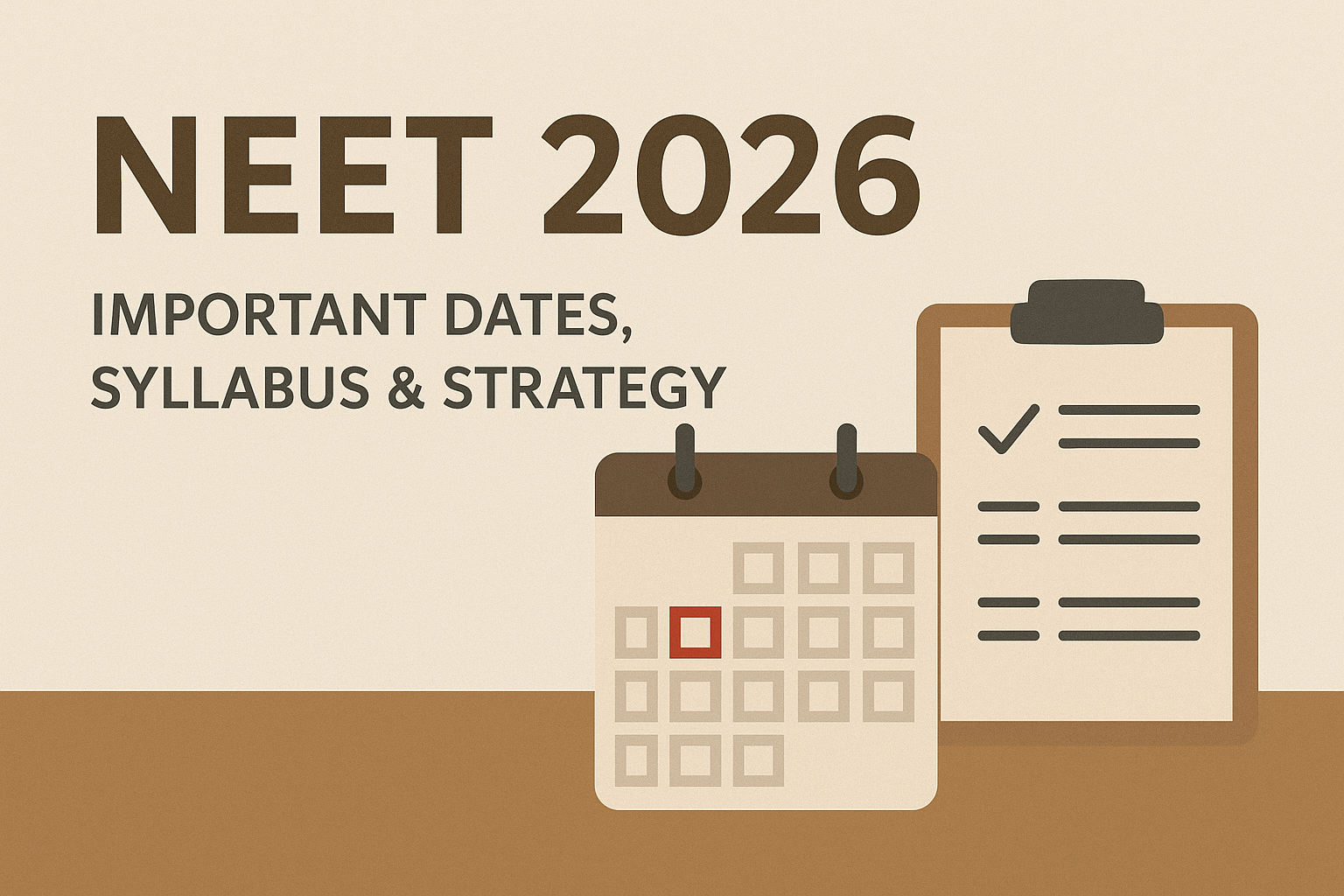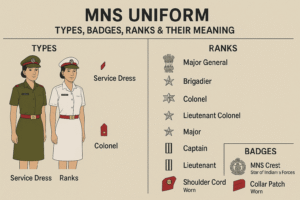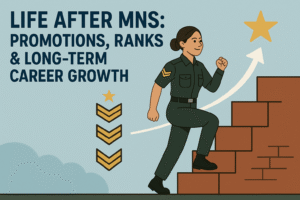If you’re planning to appear for NEET 2026, it’s crucial to stay ahead with all the essential information including exam dates, detailed syllabus, preparation strategy, and frequently asked questions. Whether you’re in Class 11, Class 12, or taking a drop year, this guide is tailored to help you streamline your NEET journey effectively.
NEET 2026 IMPORTANT DATES (TENTATIVE)
| Event | Date (Tentative) |
|---|---|
| NEET 2026 Notification Release | November 2025 |
| Start of Online Application | December 2025 |
| Last Date to Apply | January 2026 |
| Correction Window Opens | February 2026 |
| Admit Card Release | April 2026 |
| NEET 2026 Exam Date | First or Second Sunday of May 2026 |
| Answer Key and OMR Sheet Release | May or June 2026 |
| NEET 2026 Result Declaration | June 2026 |
| Counselling Begins | July 2026 |
Note: Always refer to the official website of NTA NEET (https://neet.nta.nic.in) for accurate and updated dates.
NEET 2026 SYLLABUS (SUBJECT-WISE)
The NEET syllabus is based on the NCERT curriculum of Classes 11 and 12. It covers Physics, Chemistry, and Biology.
Biology Syllabus for NEET 2026
Class 11 Topics:
Diversity of Living Organisms
Structural Organisation in Animals and Plants
Cell Structure and Function
Plant Physiology
Human Physiology
Class 12 Topics:
Reproduction
Genetics and Evolution
Biology and Human Welfare
Biotechnology and Its Applications
Ecology and Environment
Physics Syllabus for NEET 2026
Class 11 Topics:
Physical World and Measurement
Kinematics
Laws of Motion
Work, Energy and Power
Thermodynamics
Oscillations and Waves
Properties of Bulk Matter
Class 12 Topics:
Electrostatics
Current Electricity
Magnetic Effects of Current and Magnetism
Electromagnetic Induction
Optics
Dual Nature of Matter
Atoms and Nuclei
Electronic Devices
Chemistry Syllabus for NEET 2026
Class 11 Topics:
Basic Concepts of Chemistry
Structure of Atom
Classification of Elements
Chemical Bonding and Molecular Structure
Thermodynamics
Equilibrium
Redox Reactions
Hydrocarbons
Class 12 Topics:
Solid State
Solutions
Electrochemistry
Chemical Kinetics
Surface Chemistry
Coordination Compounds
Haloalkanes and Haloarenes
Biomolecules
Polymers
Chemistry in Everyday Life
NEET 2026 PREPARATION STRATEGY
A smart and systematic strategy can boost your score significantly. Here’s a month-wise approach:
1. Start Early (Class 11 or Before)
Understand NCERT thoroughly, especially Biology
Create short notes and flashcards
Develop a daily habit of studying all three subjects
2. Divide and Rule
Allocate equal time to all three subjects daily
Prioritize Biology for high return (50 percent weightage)
Practice Physics numericals and Chemistry reactions daily
3. Mock Tests and Previous Year Questions
Start solving previous year questions early
Take weekly mock tests to evaluate your performance
Use OMR sheets while practicing for real-time accuracy
4. Time Management
Make a monthly, weekly, and daily timetable
Target at least 6 to 8 hours daily study time during peak months
Include regular breaks and revision slots
5. Coaching and Resources
Use standard NEET books:
Biology: NCERT and MTG Objective
Chemistry: NCERT and OP Tandon or Modern ABC
Physics: NCERT, HC Verma, and D C Pandey
Consider coaching (online or offline) for conceptual clarity
6. Revision and Notes
Keep revising NCERT line by line
Prepare sticky notes, diagrams, and charts
Solve assertion-reason and statement-type questions
NEET 2026 EXAM PATTERN (EXPECTED)
| Feature | Details |
|---|---|
| Mode of Exam | Offline (Pen and Paper Based) |
| Duration | 3 hours 20 minutes |
| Total Questions | 200 (180 to be attempted) |
| Total Marks | 720 |
| Subjects | Physics, Chemistry, Biology |
| Marking Scheme | Plus 4 for correct, minus 1 for incorrect |
FREQUENTLY ASKED QUESTIONS (FAQ)
Q1. What is the best time to start preparing for NEET 2026?
Ans: Ideally from Class 11 onwards. Early preparation ensures clarity and time for practice.
Q2. Is NCERT enough for NEET 2026?
Ans: Yes, especially for Biology. But for Physics and Chemistry, additional practice from reference books is essential.
Q3. How many hours should I study daily for NEET 2026?
Ans: On average, 6 to 8 hours per day is recommended, increasing gradually as the exam nears.
Q4. Is coaching mandatory to crack NEET?
Ans: No, but it helps with discipline and expert guidance. Self-study with the right strategy can also lead to success.
Q5. Will NEET 2026 syllabus change?
Ans: As of now, the syllabus is based on NCERT Class 11 and 12 curriculum. Any updates will be notified by NTA.
Conclusion
NEET 2026 is not just a test of knowledge but also of consistency, discipline, and smart preparation. Follow a structured plan, stay updated with official announcements, and most importantly — believe in yourself.






